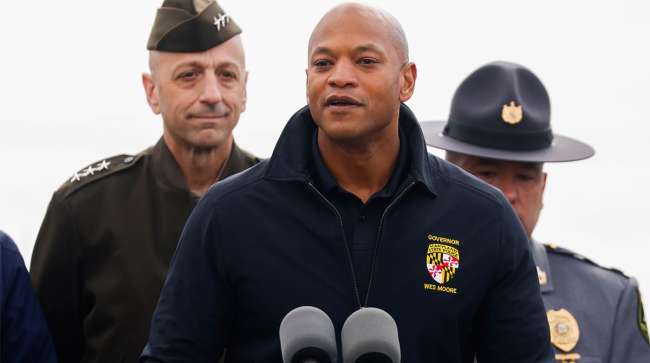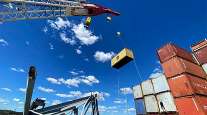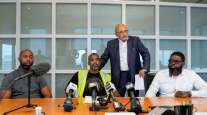Senior Reporter
Maryland Leaders Push for Federal Aid

[Stay on top of transportation news: Get TTNews in your inbox.]
The governor of Maryland in pointed remarks challenged federal lawmakers to see for themselves the devastation wrought by the collapse of the Francis Scott Key Bridge, and renewed his pleas for congressional aid to help rebuild.
“I ask you to come to Maryland. I ask you to … spend some time with our congressional delegation,” Gov. Wes Moore (D) said during an April 16 press conference, less than a month after the containership MV Dail on March 26 hit the bridge, leading to its collapse and causing the deaths of six workers on the span at the time.
“I ask you to come spend time with members of the General Assembly,” Moore went on. “I ask you to come spend some time with me. I ask you to come spend time with members of our team. I ask you to get [on] the water. I ask you to see it firsthand. I ask you to get a clear understanding of what it means to see a ship that is the size of the Eiffel Tower, that is the weight of the Washington Monument, that is sitting in the middle of the Patapsco River.”
Old Line State officials are specifically lobbying Congress to clear as soon as possible an emergency aid package that would cover the costs of the rebuilding operation.
All responsible parties will be held accountable. Our Emergency Relief program is designed to ensure that compensation for damages help offset the cost of the bridge. — Senator Ben Cardin (@SenatorCardin) April 13, 2024
On Capitol Hill, the state’s delegation recently introduced legislation meant to distribute federal funds for rebuilding and rehabilitating infrastructure at the Port of Baltimore. The bipartisan Baltimore BRIDGE Relief Act would assign the federal government the full cost of replacing the bridge. The total price tag for the rebuilding project remains unclear, but the Federal Highway Administration already has provided Maryland $60 million from its emergency account.
“The sudden collapse of the Francis Scott Key Bridge was a human tragedy and an economic tragedy — for Maryland and the nation,” Sen. Ben Cardin (D-Md.), a lead co-sponsor, said April 11. “As we continue to mourn the loss of life and this icon of our skyline, we can simultaneously begin work to heal the wounds created by this disaster. A new bridge can be a symbol of hope and resilience.”
“Reopening the Port of Baltimore and rebuilding the Francis Scott Key Bridge as fast as possible is in the interest of every American,” added Rep. Steny Hoyer (D-Md.). “That’s why it is crucial that we pass this legislation to authorize the federal government to cover the full cost of this project, in accordance with the commitment that the Biden-Harris administration made immediately after the collapse.”
Marylanders’ efforts on the Hill, however, have encountered pushback from the conservative House Freedom Caucus. The small yet influential caucus proposed conditions before it could sign off on federal assistance for the Baltimore bridge. Such conditions included exhausting existing federal aid for the area as well as recovering private sector funds stemming from liability.
House and Senate leaders have yet to schedule the aid package’s consideration. Pushback from the GOP caucus limits the bill’s bipartisan backing.
The latest update to our #FSKBridge Salvage Operations Plan includes a better visual scale for understanding our efforts to open a limited access channel within the federal channel span. pic.twitter.com/garfCtbM4z — USACE Baltimore (@USACEBaltimore) April 16, 2024
During a meeting with stakeholders on April 8, the White House’s National Economic Council indicated it had reaffirmed President Joe Biden’s commitment to “move heaven and earth” in order to expeditiously reopen the Port of Baltimore. Days later the leadership at the U.S. Department of Transportation also met with stakeholders.
According to background information the department provided, “DOT leaders began the meeting by expressing their ongoing commitment to work with supply chain partners to manage any disruptions in waterways around the globe. The department noted the effective coordination among supply chain stakeholders in the wake of the bridge collapse in Baltimore. The department also highlighted the Army Corps of Engineers’ plans to reopen shipping channels to the Port of Baltimore in the coming weeks.”
Federal officials expect crews to increase access to the site’s waterways. The National Transportation Safety Board is conducting an investigation of the collapse. The Federal Motor Carrier Safety Administration indicated the Port of Baltimore remains open for truck transactions.
Want more news? Listen to today's daily briefing below or go here for more info:




